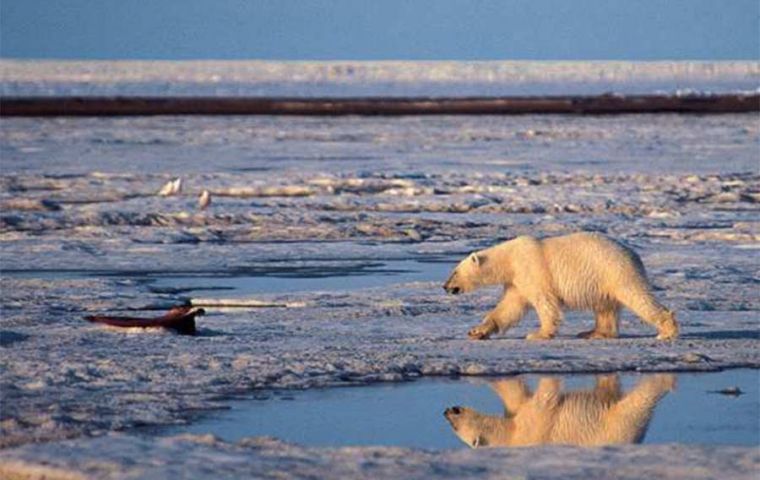MercoPress. South Atlantic News Agency
Arctic Ocean may be ice-free during the summer from 2030 onwards
 The Arctic without sea ice would affect human societies and natural ecosystems both inside and outside the region (Pic AP)
The Arctic without sea ice would affect human societies and natural ecosystems both inside and outside the region (Pic AP) According to a recent study published in the journal Nature Communications, the Arctic Ocean may be ice-free during the summer from 2030 onwards regardless of the level of greenhouse gas emissions.
“The results indicate that the first September without sea ice could occur between the years 2030-2050, whatever the scenario of emissions” of greenhouse gases, explained in the study the scientists from South Korea, Canada, and Germany who used observational data from the years 1979 to 2019 to perform these simulations.
The Arctic Ocean has an area of about 14 million square kilometers and is covered with ice most of the year, but in September the sea ice area is reduced to its maximum. In this case, the absence of ice implies an area of less than 1 million km2, as there could be residual ice along the coasts.
Climate scientists warned that this decline in the Arctic ice level would occur “a decade earlier than the most recent projections,” said Seung-Ki Min, a researcher at South Korea's Pohang and Yonsei universities and co-author of the paper, according to AFP.
The researchers considered that the disappearance of the ice could be attributed essentially to greenhouse gas emissions, while other factors such as aerosols, solar and volcanic activity are less important.
Sea ice solidifies due to the cold and its melting does not directly cause the rise in ocean levels (unlike that of the polar ice cap or glaciers) but it nevertheless has serious consequences for the environment elsewhere.
The disappearance of the ice “will accelerate warming in the Arctic, which may lead to an increase in extreme weather events in the mid-latitudes, such as heat waves and forest fires,” Seung-Ki Min explained.
In summer, ice plays a very important role because it bounces the sun's rays, the researchers noted in their report.
“The results indicate that the first September without sea ice could occur in the years 2030-2050, whatever the scenario of emissions” of greenhouse gases, explained the authors of the study, quoted by AFP.
The International Panel on Climate Change (IPCC), published in March, predicts that the Arctic will be virtually free of sea ice by September, near mid-century, under scenarios of intermediate and high emissions, but not low emissions.
However, the new study projects that the Arctic could be sea-ice-free in September from 2030-2050 under all emissions scenarios.
September is the month of the year in which the sea ice surface is reduced to the maximum.
The disappearance of the ice “will accelerate warming in the Arctic, which may lead to an increase in extreme weather events in the mid-latitudes, such as heat waves and forest fires,” said Seung-Ki Min.
An Arctic without sea ice would affect human societies and natural ecosystems both inside and outside the region, for example by changing marine activity, further accelerating Arctic warming and altering the carbon cycle, the study team said.




Top Comments
Disclaimer & comment rulesCommenting for this story is now closed.
If you have a Facebook account, become a fan and comment on our Facebook Page!